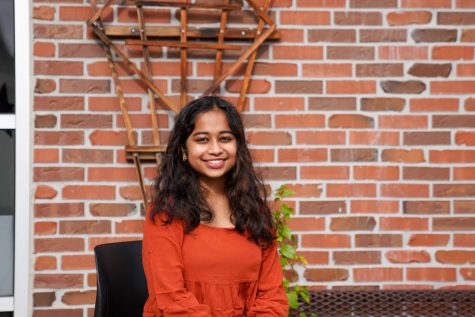Break from convention
How my perspective on public speaking changed
January 16, 2023
I never viewed myself as a public speaker.
With online speech tournaments lacking any substance, performing my speech felt like a burden, reducing my 10-minute speech (which I couldn’t care any less about) to just a green light signaling my camera was on at the top of my laptop. It was still dark outside, and while my parents were asleep in the other room, I was awake trying to rememorize a quote by some guy named Zak Slayback. I would present my speech, my heart rapidly beating for the entire 10 minutes, hoping to get to the next word without stumbling, turn my camera off and flop back into bed. After three rounds of this process, I would hope to break to finals — sometimes, I would get lucky, but most times, I would end up planting my face in a pillow while listening to sad songs to reignite the disappointment. If I failed, I would wake up the next morning as if nothing had happened. If I broke, I would wake up the next day with my ego boosted to heights it’s never reached before, ready to possibly be deflated in the next tournament.
A few days ago, I had my first high school in-person tournament, and it changed everything.
There were no more green buttons, black boxes, mute or unmute buttons. No cameras on and off. There were people — people who were there to, let’s be real, win. But more than anything, there were people there to listen to, learn from and grow with. People I had never seen before in the morning became my new friends by the end of the tournament. Online, the only speech I listened to (probably at least 1,000 times) was my own. But in that one tournament, I heard 20 different speeches by 20 different people, and I actually listened to them. After hearing each speech, I learned something new about myself.
My speech journey started in sixth grade when I made the worst decision of my life and decided to join Interpretation (no offense), a Speech branch where I had to act out a prewritten script. That was when I learned that I could never be an actor or play charades. So I decided to tone myself down to something more conventional: Original Oratory. OO is a persuasive eight to 10 minute speech that addresses a societal problem.
But after the horror of my attempted acting in sixth grade, I didn’t have the confidence to be extra or the courage to do more, even though it was only this false sense of dignity that was at stake. Whether it was the imitation of Kim Kardashian, my introduction or my trembling voice during the dramatic speeches inspired by an Indian movie, all the phases I have gone through have become my enemy, something I disassociated myself from. I wanted to be charismatic while seeming intellectual, inciteful and captivating, but I didn’t do anything about it. Because I was scared — scared of embarrassing myself because I lacked confidence from my multiple failed attempts.
After watching national level speeches, I felt the need to imitate them to fit into the mold of the “traditional orator.” The same old assertive tone, jokes which weren’t really jokes or fabricated stories to potentially grab the audience’s attention. I felt the obligation to develop that traditional speech voice, pulling out a facade when I present and going back to my seat to return to my normal self. At that point, it didn’t feel like public speaking — it felt like a chore. This ingenuity in my voice and the pressure to be normal led to just that. Normal. Nothing outstanding, nothing memorable. Just that. A girl in a blazer presented her 10 minute speech for the 20th time that day.
After that tournament, more than feeling relieved, I felt disappointed. Why couldn’t I just break out of the mold and do something more, something different, something more like me? Why was I writing my speech for my judges rather than myself? And most importantly, why did it take two years of public speaking to realize that? Was it the in-person experience, or was it feeling the joys and the pains of the speakers? No matter what, I just knew that I was doing something wrong.
While I managed to progress to the semifinals, I didn’t final. It hurt, but I couldn’t expect it because there were other people who were carefree, and their speeches were actually something to remember.
So, that night, I went back to my speech document and just wrote. I wrote what I wanted to say, not what I was expected to say. And it felt good. I actually felt like a public speaker because what I was saying on the stage was something I cared about, not something that I did as an obligation.
I still don’t view myself as a public speaker because I never really publicly speak unless you count a classroom with six other students public speaking. But Speech Club allowed me to find my voice. To speak about something with passion. To just not care about conventional.
















